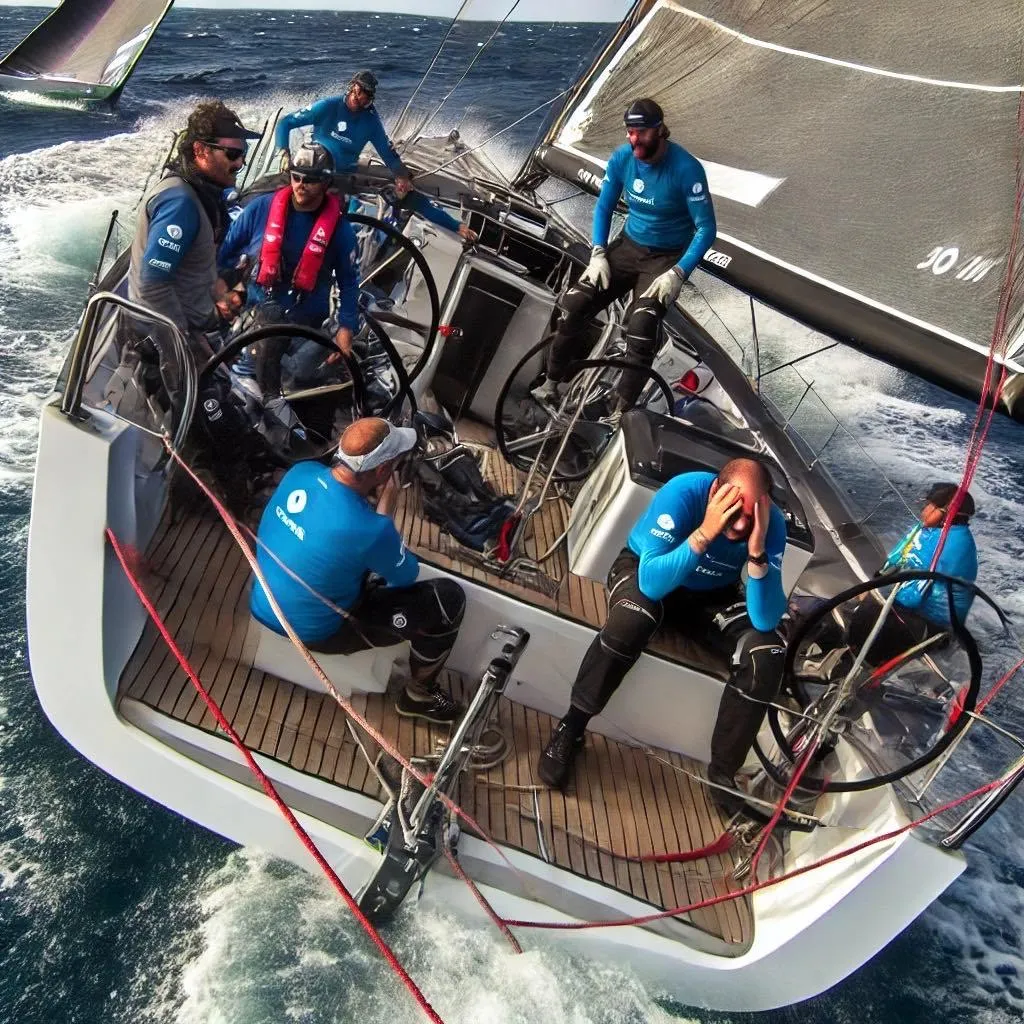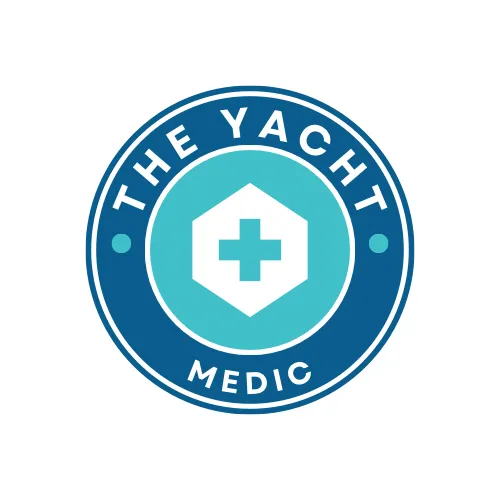See Our Latest Blogs
Beyond Boundaries, Beyond Rescue
Mastering Self Reliance At Sea

Mental Health and Psychological First Aid Scenarios for Superyachts
Are you doing mental health & psychological safety scenarios in your medical drills?
Here are 5 Mental Health and Psychological First Aid Scenarios for Superyachts.
1. Debrief - Crew management post trauma
2. Alcohol & Drugs - guest drink is spiked
3. Anxiety - A panics attack during crisis
4. Anxiety - Anxiety in crew member post a near miss
5. Burn Out - Depression & burn out mid season.
Scenario 1: Crew Management After a Major Trauma
Situation:
A crew member has suffered a severe injury, such as a broken leg or head trauma, during a high-stress situation, like a storm or accident on deck.
The rest of the crew is visibly shaken, struggling to continue their duties, and showing signs of shock and distress.
How to Manage:
1. Immediate Debrief: Gather the crew together in a safe, quiet space. Acknowledge the traumatic event and allow everyone to share their feelings.
This is crucial for processing the event and preventing the buildup of unresolved stress.
2. Psychological First Aid: Offer psychological first aid by validating their emotions and providing comfort. Normalize their reactions—it's okay to feel scared, shocked, or upset after witnessing a trauma.
3. Rest and Support: If possible, rotate duties to give affected crew members some rest. Assign tasks that allow them to regain composure while still contributing to the team.
4. Ongoing Monitoring: Keep an eye on the crew in the days following the incident. Watch for signs of PTSD or prolonged distress.
Encourage them to talk about their feelings and offer professional support if needed.
Scenario 2: Drug Abuse – Drink Spiking
Situation:
One of the guests on the yacht exhibits strange behavior after drinking. They seem disoriented, overly aggressive, or even unconscious.
It's suspected that their drink may have been spiked, either intentionally or accidentally.
How to Manage:
1. Immediate Safety: DRABC Ensure the safety of the guest and anyone else involved. If the guest is unconscious, place them in the recovery position and monitor their breathing. Contact medical services immediately, this will be treated as a poisoning. It’s very serious.
2. Isolate the Scene: If possible, secure the area where the incident occurred to prevent further exposure or contamination.
Preserve any evidence, such as the drink or bottle, for medical or legal purposes.
3. Crew Communication: Inform the crew of the situation with clear, calm communication.
Assign specific roles—one person to monitor the guest, another to handle communications, such as telemedicine and others to manage the yacht.
4. Psychological Support: Offer psychological first aid to the guest once they are stable. Reassure them and validate their experience. If other guests are aware of the situation, offer support to them as well, as they may feel distressed or unsafe.
5. Post-Incident Care: After the immediate crisis is managed, ensure the affected guest has access to medical care and counseling.
Debrief the crew on the incident and review protocols to prevent future occurrences.
Scenario 3: Panic Attack During a Crisis
Situation:
During a challenging navigation or emergency situation, one of the crew members suddenly begins to hyperventilate, experiences chest pain, and feels like they are losing control—classic symptoms of a panic attack.
How to Manage:
1. Immediate Calm & Assess: DRABC (make sure it’s not cardiac pain) Guide the crew member to a quiet space away from the center of activity, if possible. Contact telemedicine.
ACCE - Speak to them in a calm, reassuring voice, encouraging slow, deep breaths.
2. Grounding Techniques: Use grounding techniques to bring them back to the present moment.
Ask them to focus on the feel of the deck under their feet, the sound of the sea, or the rhythm of their breathing.
3. Short-Term Relief: Encourage the use of breathing techniques like 4-7-8 breathing to reduce panic symptoms.
Assure them that what they are experiencing is a panic attack and that it will pass.
4. Reassurance and Rest: Allow them some time to recover and offer water or a light sweet snack.
Reassure them that they are safe and that their feelings are valid.
Reassure, Reassure, Reassure +++
5. Follow-Up: Check in with the crew member after the incident to see how they are feeling. Offer additional support or a referral to a mental health professional if necessary.
6. Debrief with crew and explain this is a very normal occurrence that while it looks scary, can happen to anyone, anytime.
Scenario 4: Post-Incident Anxiety
Situation:
After a near-miss or dangerous incident on the yacht, a crew member develops anxiety about performing their duties.
They might avoid certain tasks, experience physical symptoms like sweating or shaking, or express fear of another incident happening.
How to Manage:
1. Open Communication: Have a private conversation with the crew member to discuss their feelings. Encourage them to express their fears without judgment.
2. Gradual Exposure: Gradually reintroduce the tasks that are causing anxiety, starting with less challenging duties. Offer support and supervision to build their confidence.
3. Mindfulness and Relaxation: Teach them mindfulness techniques and relaxation exercises to manage anxiety when it arises. Encourage regular practice to build resilience.
4. Peer Support: Pair them with a more experienced crew member who can provide guidance and reassurance during tasks. This peer support can help alleviate anxiety.
5. Long-Term Monitoring: Keep an eye on their progress. If anxiety persists or worsens, recommend professional counseling, coaching or therapy.
Scenario 5: Depression or Burnout in a Crew Member
Situation:
A crew member starts showing signs of depression or burnout—they’re disengaged, fatigued, and no longer interested in their duties or socializing with the crew.
Their performance is slipping, and they seem emotionally withdrawn.
How to Manage:
1. Early Intervention: Approach the crew member in a compassionate, non-judgmental way. Express concern and offer a listening ear, allowing them to share what’s going on without pressure.
2. Workload Adjustment: If possible, adjust their workload temporarily to reduce stress. Encourage them to take breaks, rest, and engage in activities that bring them joy or relaxation.
3. Support Resources: Provide information on available support resources, such as mental health professionals, confidential helplines, or onboard wellness programs.
4. Team Awareness: Without breaching confidentiality, make the team aware of the importance of supporting each other during stressful times. Foster a culture where it’s okay to ask for help.
5. Long-Term Care: Follow up regularly with the crew member to check on their well-being. If necessary, help them access professional mental health care or consider arranging shore leave for recuperation.
Each of these scenarios highlights the importance of proactive leadership skills such as resilience, mental health management and psychological first aid.
By recognizing the signs early and knowing how to respond, you can ensure the well-being of your crew and guests, even in the most challenging situations.
Please note: This is not medical or psychological advice. This is just some ideas for scenario training. I am an RN, Medical Trainer & Mental Health/Mindset Coach. I am not a Doctor, Psyciatrist, Psychologist or Pastor. I can try & refer you if required.
These scenarios are based on Psychological & Resilience First Aid Training.
Sail Safely with Expert Medical Training
Resilience & Psychological First Aid For Yachts

Resilience First Aid (RFA) is a proactive approach to mental health, designed to equip yacht crew with the skills to prevent burnout, manage stress, and strengthen mental resilience.
Psychological First Aid (PFA) is an
immediate, compassionate response to mental distress after a crisis,
support each other emotionally, reduce trauma impact, and promote recovery
after major incidents.
Medical First Aid & Planning for Yachts

This course is designed to equip yacht owners & crew with essential first aid skills and the knowledge to set up a well-stocked and effective medical kit. Whether you're preparing for remote cruising or need to update your onboard medical resources, this course ensures you’re ready for any medical emergency.
Yachts operate in remote locations, often far from immediate medical help.
Adventure Preparation for Remote Environments

When you venture into remote environments preparation is everything. The Adventure Ready Program equips leaders, yacht crew, expedition teams, and outdoor professionals with the medical skills, resilience training, and leadership strategies
needed to handle emergencies, adapt under pressure, and thrive in extreme environments.
Be Prepared, Stay Safe & Protect Your Crew
© The Yacht Medic - All Rights Reserved,
Photography & Media by Oli Riley Photography

info@the-yacht-medic.com
+34610120242
Palam de Mallorca, Spain
